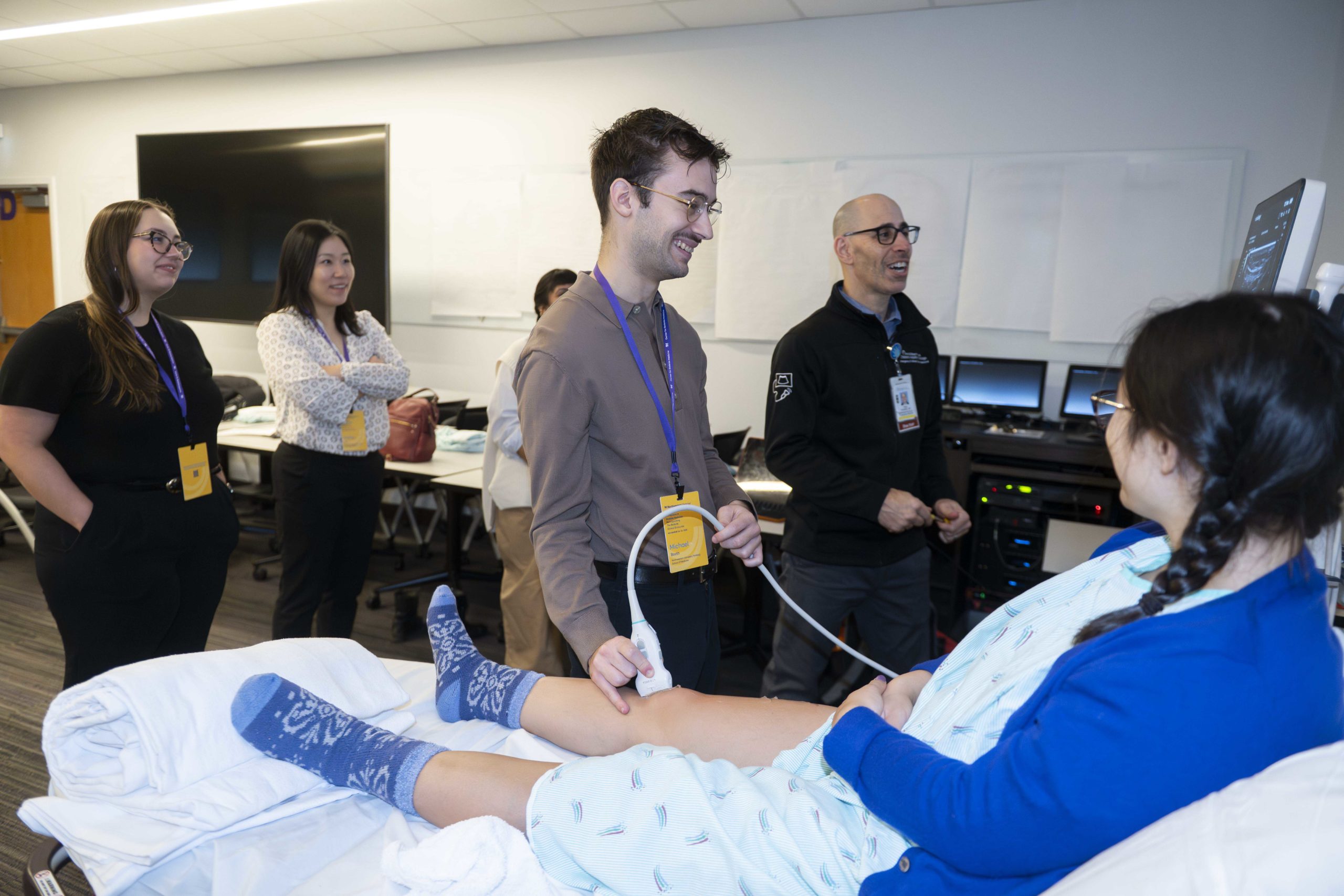Media Coverage
The work done by Northwestern University Feinberg School of Medicine faculty members (and even some students) is regularly highlighted in newspapers, online media outlets and more. Below you’ll find links to articles and videos of Feinberg in the news.
-
WGN Chicago
–
CDC poised to loosen isolation restrictions for COVID infection
The Center for Disease Control is poised to loosen restrictions after a COVID infection. But doctors say people still have a responsibility of diligence. “People who have covid instead of isolating for five days, making the recommendation that they isolate until they stop having a fever,” Michael Angarone, an infectious disease specialist with Northwestern Medicine said. The key is to still test and if someone is positive for SARS Co-V2, the virus that causes COVID, the fever may last for up to three days. “And once they haven’t had a fever for 24 hours without taking any fever, reducing medications, they can come off isolation,” Angarone said. But as cases rose and federal health experts were worried about the triple threat of respiratory illnesses, COVID, flu and RSV, they backed off. “There were a lot of people getting sick but we just weren’t seeing as many people getting severely ill,” Angarone said. “I think the more they’ve gotten the infection, the less severe the symptoms are and it tends to be a little bit short-lived.”
-
Yahoo! News
–
Here’s What An Asthma Attack Actually Feels Like, According to Pulmonologists
Here’s exactly what happens: First, your airways become swollen and inflamed. The muscles around your airways begin to contract, and your airways begin to narrow. Plus, your airways may also produce extra mucus, which also reduces the space for air to flow through. You may start coughing or wheezing, or you might realize that you’re feeling short of breath. Your chest may feel tight and painful. You may feel like you’re not able to breathe in enough air—or you may feel like you’re trying to breathe through a straw. If you have a child with asthma, encourage them to speak up if they feel like they are on the verge of having an asthma attack. “If they are home, they need to tell whoever is there to help them,” says Luis Torero, MD, a pediatric pulmonologist with Northwestern Medicine’s Regional Medical Group. “If they are at school, the same thing. They shouldn’t be shy.” And if you’re the one with asthma, the same advice applies. If you need help, ask.
-
The Washington Post
–
How long covid takes a toll on relationships and intimacy
While much has been written about the physical toll of long covid, less is known about how the condition affects relationships. Common symptoms such as fatigue, brain fog and dizziness can make it difficult for someone with long covid to help with household chores, go out on dates or be physically intimate. As a result, experts say many long-covid patients struggle with strained relationships. Many of the challenges couples face when one partner has long covid are similar to the challenges of any relationship, such as communication, sexual intimacy and navigating career and home priorities. But when one partner has long covid, how couples approach these issues often requires extra planning, compassion and compromise. Long covid is also uniquely challenging for couples because of how much uncertainty it brings into relationships, said John S. Rolland, an adjunct professor of psychiatry at Northwestern University’s Feinberg School of Medicine and author of “Helping Couples and Families Navigate Illness and Disability.” “It becomes a question of ‘When do we start to plan our lives as if this is not going to go away?’” Rolland said. “If every hope is put on a cure, what happens if the illness doesn’t go away?” With long covid, he said, people may focus so much on trying to cure the illness that they forget to maintain a healthy connection with their partner.
-
Yahoo! News
–
The best hair growth products of 2024, according to dermatologists
Losing your hair or experiencing thinning hair is a stressful and often embarrassing experience that affects millions of people in the U.S. But the good news is, for most individuals, this is a temporary condition that can be reversed with the right treatments and products. “The most common cause of hair loss is androgenetic alopecia, aka male pattern hair loss or female pattern hair loss,” explains Amy Forman Taub, MD, FAAD, a board-certified dermatologist and assistant professor at Northwestern University Medical School. “The second most common is called telogen effluvium and can be caused by many things, including severe stress, childbirth, certain drugs and thyroid abnormalities,” Taub says. If you notice hair loss three to four months after a mild to severe bout of Covid or the flu, you can almost bet that is the cause. But there are other causes too. “People can also develop hair loss from underlying medical conditions like alopecia areata,” Taub says.
-
HealthDay
–
Doctor ‘Alert’ Warnings Helped One Health System Reduce Unnecessary Tests
The doctor tapped at his computer, ordering a routine prostate exam for an 80-year-old man, when a dramatic yellow alert popped up on the patient’s electronic health record. “You are ordering a test that no guideline recommends,” it warned. “Screening with PSA can lead to harms from diagnostic and treatment procedures. If you proceed without a justification, the unnecessary test will be noted on the health record.” The message was part of a strategy Northwestern Medicine investigators were testing to see if it would prompt doctors to stop ordering unnecessary screenings for older adults. “To our knowledge, this is the first study to significantly reduce all of the unnecessary testing or treatments studied using point-of-care alerts,” said lead researcher Stephen Persell, a professor at Northwestern University Feinberg School of Medicine in Chicago. “We believe that incorporating elements like a focus on potential harms, sharing social norms and promoting a sense of social accountability and reputational concerns led to the effectiveness of these messages,” Persell said in a university news release.
-
Yahoo! News
–
5 tips to keep your brain sharp for when you’re Biden’s age
Despite his active lifestyle and a reasonably clean bill of health, Biden has long faced criticism for his age and judgment surrounding his memory and mental acuity. With the President’s cognitive capabilities making headlines again, here are five top tips from experts to keep your brain sharp for when you get to be Biden’s age. Tips include living like you’re in a Blue Zone, managing your exercise and diet, taking a probiotic with herbal tea, trying new things and continuing to socialize. Brain health isn’t limited to the choices we make individually. According to experts, one key component to keeping your mind healthy is ensuring you get enough social stimulation as well. “In general, people with strong social networks tend to live longer,” Talia Lerner, PhD, an assistant professor of neuroscience at Northwestern University Feinberg School of Medicine explained. “Spending time with other people is good for your emotional life, which is good for brain health.”
-
NBC 5 Chicago
–
Post-COVID insomnia? Experts weigh in on new study showing sleep impacts of COVID
If you’ve had trouble sleeping following a COVID diagnosis, you aren’t alone. In fact, a new study seems to have found a connection between the two, particularly in milder cases of COVID-19, that experts say isn’t entirely unexpected. “So after SARS-CoV-2 infection, there’s certainly a lot of neurocognitive issues that come about. So specifically, people tend to have symptoms of what we call brain fog, or issues with memory and their attention span, and a lot of these are linked to primary neurological brain issues and ailments from whatever COVID has done to their body in terms of inflammation, or other biological patterns to it. And so it’s not really surprising that actually, given that your brain also manages your circadian rhythms, that people might have issues with either sleep disordered breathing on the aspect of insomnia, fractured sleep, or even sleep apnea in many individuals,” Marc Sala, MD, the co-director of the Comprehensive COVID Center at Northwestern Medicine. “So I think that’s still being fleshed out in the research, but that actually isn’t very surprising to me that people who have long COVID might also have a detriment to some form in their sleeping patterns, knowing what it can do to people’s processing speeds, memory, attention, and all other aspects that relate to the brain to begin with.”
-
Yahoo! News
–
Magic Hangover Pills Are Popping Up Everywhere—But Do They Actually Work?
Hangovers are a multi-part affair. It’s like your whole body gets together the morning after you drink to talk about how to ruin your life the following day. Alcohol’s diuretic or dehydrating effects cause most hangover symptoms: the bleary-eyed headache and incessant need to pee, and alcohol also disrupts your GI system, leading to gastro issues like diarrhea and nausea. But another issue with hangovers is the accumulation of alcohol’s most toxic byproduct: acetaldehyde. That’s where these supplements come in. “When you drink, there’s a hormone that’s suppressed, and it causes you to urinate more, and you can become dehydrated, but you’re not losing just water, you’re losing other minerals and electrolytes from your body too,” explains Aarati Didwania, MD, who specializes in internal medicine at Northwestern Medicine. “The way that all these pills are being marketed is that they’re replacing what you’re losing. Some of them also seem to claim that they’re helping the way that your liver metabolizes the alcohol.” “For the majority of the population, [these hangover supplements are] not going to cause any harm. But it’s the fact that they’re unregulated, and you don’t really know the exact quantities of everything that’s in them or who’s monitoring what’s written on the outside of the packaging versus what’s actually in the pill that I think is the danger,” Dr. Didwania says, adding that if you’re taking a multi-vitamin daily, you’re probably getting the same benefits. Another worry is that people might falsely assume that taking these supplements means they’re protected from the effects of alcohol, which could then encourage excessive drinking—something that study after study proves isn’t healthy.
-
CNN
–
What is a typical degree of cognitive ability for a person in their 80s?
Concerns about age and mental fitness have been a recurring theme through the past two presidencies and are set to only mount in 2024 with two frontrunner candidates nearing or exceeding the age of 80. Common changes in thinking as people age include slower word and name recall, difficulty with multitasking and mild decreases in attention span, according to the UCSF Memory and Aging Center. These skills are part of what scientists call fluid abilities, which decline steadily throughout our lifetimes. “Fluid abilities are things like processing speed, attention, working memory. This stuff requires cognitive efficiency,” said Molly Mather, PhD, an assistant professor of psychiatry and behavioral sciences at Northwestern University’s Feinberg School of Medicine. “It’s thought that general wear and tear happens as we get older and chips away at cognitive efficiency.” Natural changes happen in the brain as someone ages. Certain parts that are important to learning and other complex mental activities shrink, connectivity between neurons may become less effective, blood flow may decrease, and inflammation may increase.
-
Nature
–
Turbocharged CAR-T cells melt tumours in mice – using a trick from cancer cells
Cancer cells are the ultimate survivors, riddled with mutations that let them thrive when healthy cells would die. These same mutations can boost the ability of game-changing cell therapies to quash cancer, a study in mice shows. Among these therapies are chimeric antigen receptor (CAR) T cells, which are already used to treat several types of blood cancer. The new study shows that engineered CAR T cells carrying a mutation that was first found in cancerous T cells can vanquish tumors that don’t respond to current CAR-T therapies. “It’s a very special molecule, it seems to be able to beat all the tests we put to it,” says study co-author Jaehyuk Choi, a dermatologist at Northwestern University Feinberg School of Medicine.






